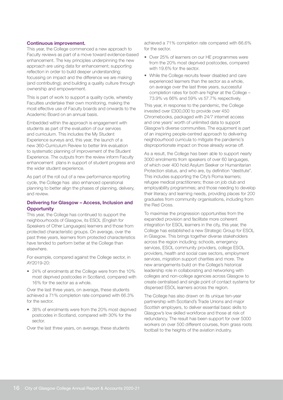
16 City of Glasgow College Annual Report & Accounts 2020-21
Continuous improvement.
This year, the College commenced a new approach to
Faculty reviews as part of a move toward evidence-based
enhancement. The key principles underpinning the new
approach are using data for enhancement; supporting
reflection in order to build deeper understanding;
focussing on impact and the difference we are making
(and contributing); and building a quality culture through
ownership and empowerment.
This is part of work to support a quality cycle, whereby
Faculties undertake their own monitoring, making the
most effective use of Faculty boards and onwards to the
Academic Board on an annual basis.
Embedded within the approach is engagement with
students as part of the evaluation of our services
and curriculum. This includes the My Student
Experience surveys and, this year, the launch of a
new 360-Curriculum Review to better link evaluation
to systematic planning of improvement of the Student
Experience. The outputs from the review inform Faculty
enhancement plans in support of student progress and
the wider student experience.
As part of the roll out of a new performance reporting
cycle, the College has also enhanced operational
planning to better align the phases of planning, delivery,
and review.
Delivering for Glasgow - Access, Inclusion and
Opportunity
This year, the College has continued to support the
neighbourhoods of Glasgow, its ESOL (English for
Speakers of Other Languages) learners and those from
protected characteristic groups. On average, over the
past three years, learners from protected characteristics
have tended to perform better at the College than
elsewhere.
For example, compared against the College sector, in
AY2019-20:
• 24% of enrolments at the College were from the 10%
most deprived postcodes in Scotland, compared with
16% for the sector as a whole.
Over the last three years, on average, these students
achieved a 71% completion rate compared with 66.3%
for the sector.
• 38% of enrolments were from the 20% most deprived
postcodes in Scotland, compared with 30% for the
sector.
Over the last three years, on average, these students
achieved a 71% completion rate compared with 66.6%
for the sector.
• Over 25% of learners on our HE programmes were
from the 20% most deprived postcodes, compared
with 19.6% for the sector.
• While the College recruits fewer disabled and care
experienced learners than the sector as a whole,
on average over the last three years, successful
completion rates for both are higher at the College -
73.9% vs 66% and 59% vs 57.7% respectively.
This year, in response to the pandemic, the College
invested over £300,000 to provide over 450
Chromebooks, packaged with 24/7 internet access
and one years' worth of unlimited data to support
Glasgow's diverse communities. The equipment is part
of an inspiring people-centred approach to delivering
neighbourhood curricula to mitigate the pandemic's
disproportionate impact on those already worse off.
As a result, the College has been able to support nearly
3000 enrolments from speakers of over 60 languages,
of which over 400 hold Asylum Seeker or Humanitarian
Protection status, and who are, by definition "destitute".
This includes supporting the City's Roma learners;
refugee medical practitioners; those on job club and
employability programmes; and those needing to develop
their literacy and learning needs, providing places for 200
graduates from community organisations, including from
the Red Cross.
To maximise the progression opportunities from the
expanded provision and facilitate more coherent
integration for ESOL learners in the city, this year, the
College has established a new Strategic Group for ESOL
in Glasgow. This brings together diverse stakeholders
across the region including: schools, emergency
services, ESOL community providers, college ESOL
providers, health and social care sectors, employment
services, migration support charities and more. The
new arrangements build on the College's historical
leadership role in collaborating and networking with
colleges and non-college agencies across Glasgow to
create centralised and single point of contact systems for
dispersed ESOL learners across the region.
The College has also drawn on its unique ten-year
partnership with Scotland's Trade Unions and major
Scottish employers, to deliver essential basic skills to
Glasgow's low skilled workforce and those at risk of
redundancy. The result has been support for over 5000
workers on over 500 different courses, from grass roots
football to the heights of the aviation industry.